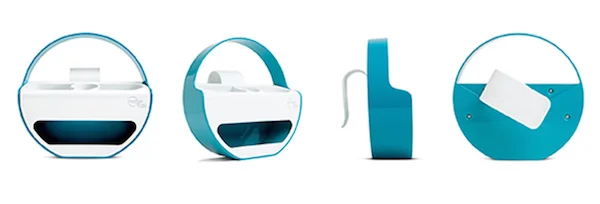Fitsi bedside caddy promotes patient hygiene
Device integrates antimicrobial technology from Plastics Color Corp.
By Norbert Sparrow
April 29, 2016
A bedside caddy developed by a nurse could help combat hospital-acquired infections (HAIs) simply by making it more convenient for patients to wash their hands. Plastics Color Corp. (PCC; Calumet City, IL), a supplier of custom polymer solutions, compounds, colorants and additive masterbatches with a global footprint, brought its expertise to the project and shared this story.
We are often told that washing our hands is the first line of defense against spreading germs and contracting a cold or the flu. You would think that diligent hand washing would be second nature in a hospital setting, but the facts tell us otherwise. Public health organizations estimate that 1.7 million HAIs occur in U.S. hospitals each year, resulting in 99,000 deaths and an estimated $20 billion in healthcare costs. While basic hygiene is only one of many contributing factors to HAIs, it is a simple and remarkably effective tool. While medical personnel, we assume, follow protocol, several studies indicate that patients do not, as a rule, wash their hands as often as they should. It’s not always their fault. Many patients are bedridden, for example, and it may be painful, even impossible, for them to get to the sink. That is what prompted nurse Kathleen Puri to invent the Fitsi bedside caddy.
The Fitsi bedside caddy allows patients to keep hand sanitizer, lip balm, lotion and other basic care essentials within arm’s reach. It serves as a physical reminder to practice hand hygiene. Designed with a flat bottom and a rotatable clip, Fitsi can sit on a bedside table or conveniently attach to a patient’s bedside rail. A built-in handle allows patients to pick up the caddy and take it to the bathroom.
The Fitsi’s good influence extends beyond the patient. In its press release, PCC notes that hospital visitors are derelict when it comes to washing their hands, and, citing a New York Timesarticle, that even “hospital workers wash their hands as little as 30% of the time that they interact with patients." In this context, the Fitsi serves as a physical reminder that will help patients, their caregivers and their visitors to practice good hand hygiene, notes PCC.
Considering that the device is designed to help patients avoid infections, it’s only fitting that the Fitsi have built-in antimicrobial features, says PCC. Puri and her team settled on MicroBlok S, an antimicrobial formulation developed by PCC.
MicroBlok S inhibits the growth of a broad spectrum of microorganisms on surfaces, reduces stains and odors, and impedes deterioration thanks to the uniform dispersion of silver ions throughout a polymer matrix. The silver ions create a large internal-specific surface within the polymer, producing high-efficiency antimicrobial action, according to the company. The antimicrobial effect is not diminished over time, and the MicroBlok product line can be custom blended in a variety of resins, including TPU, PC, ABS, PP, and PE.



